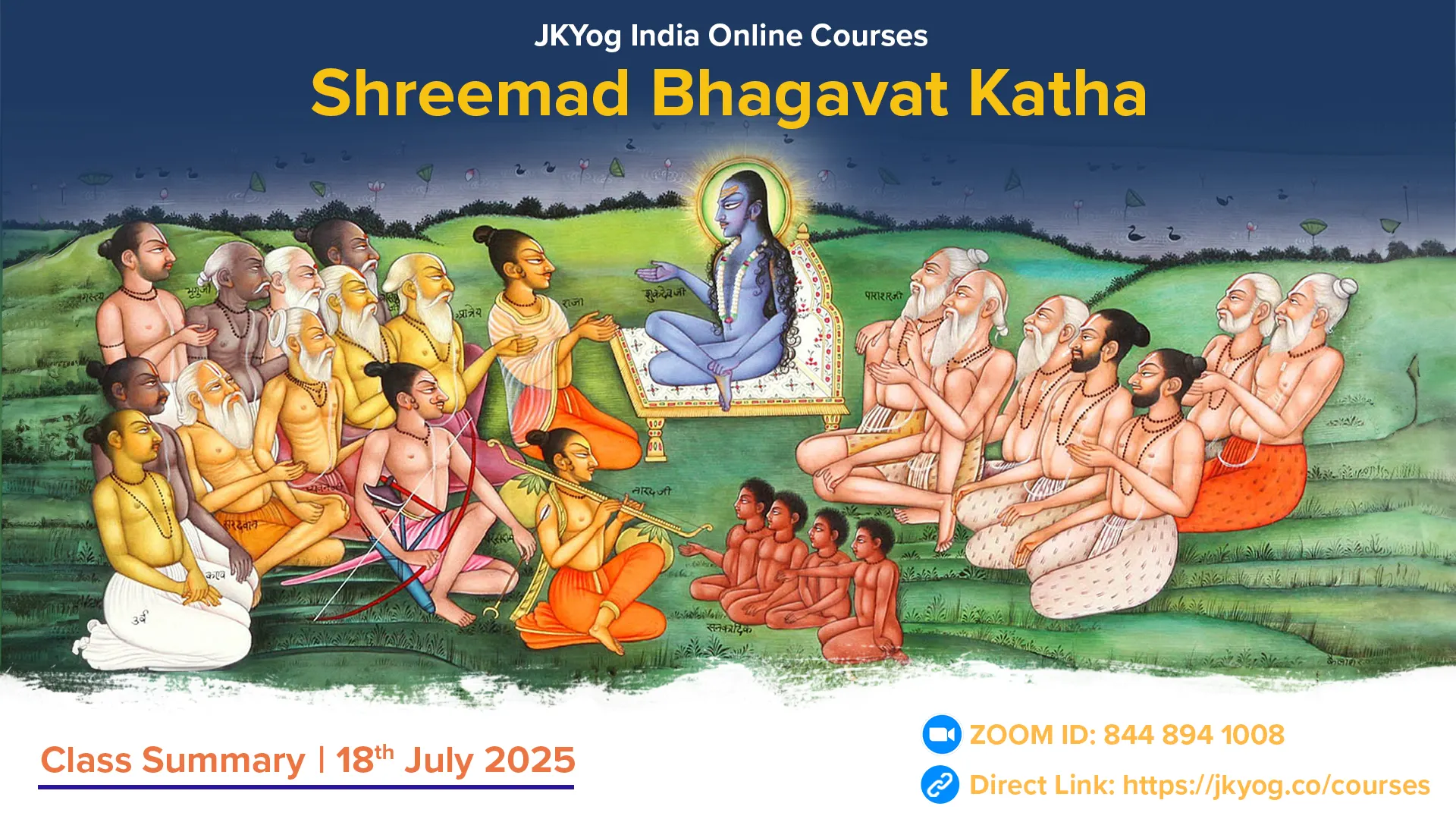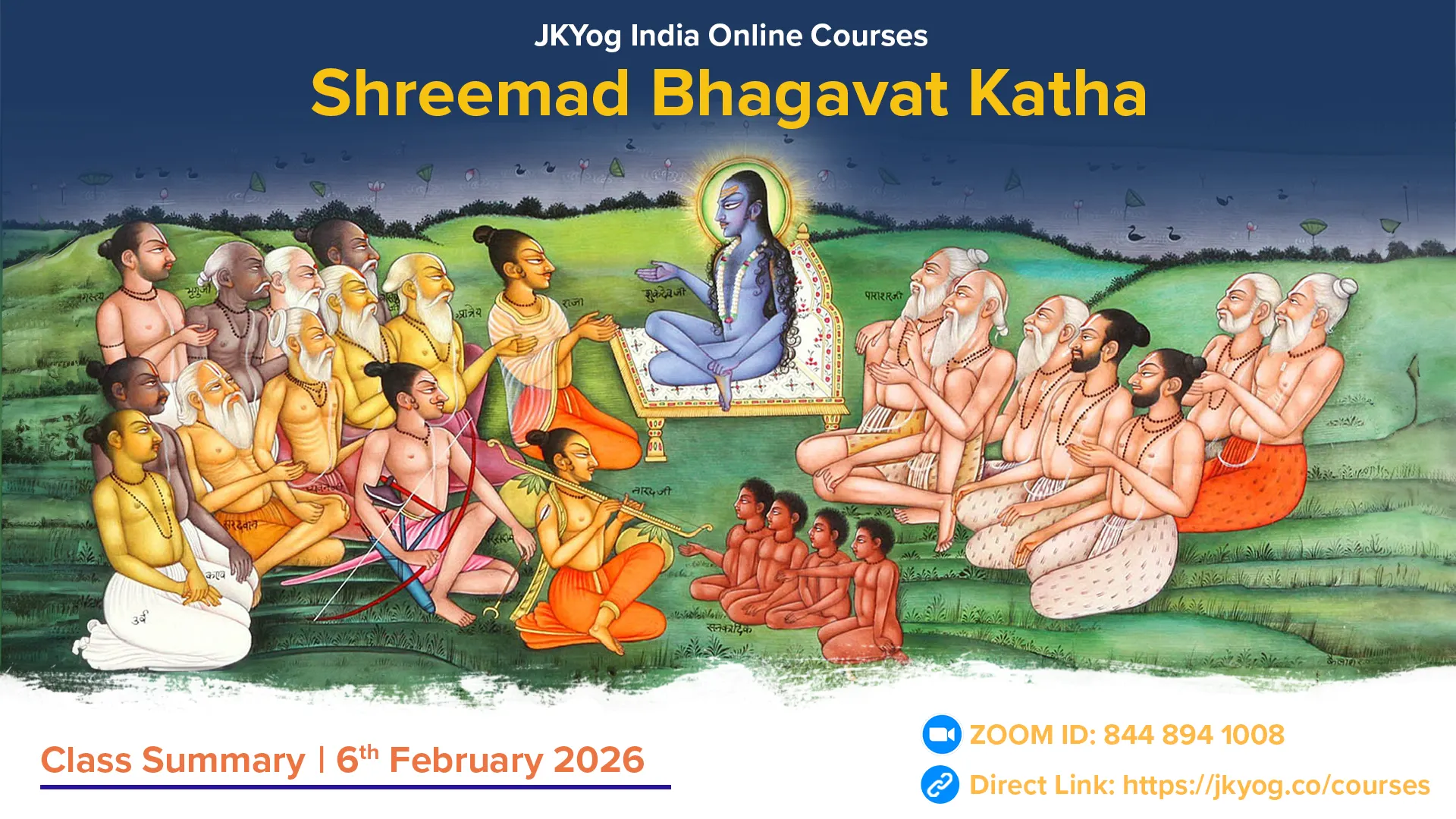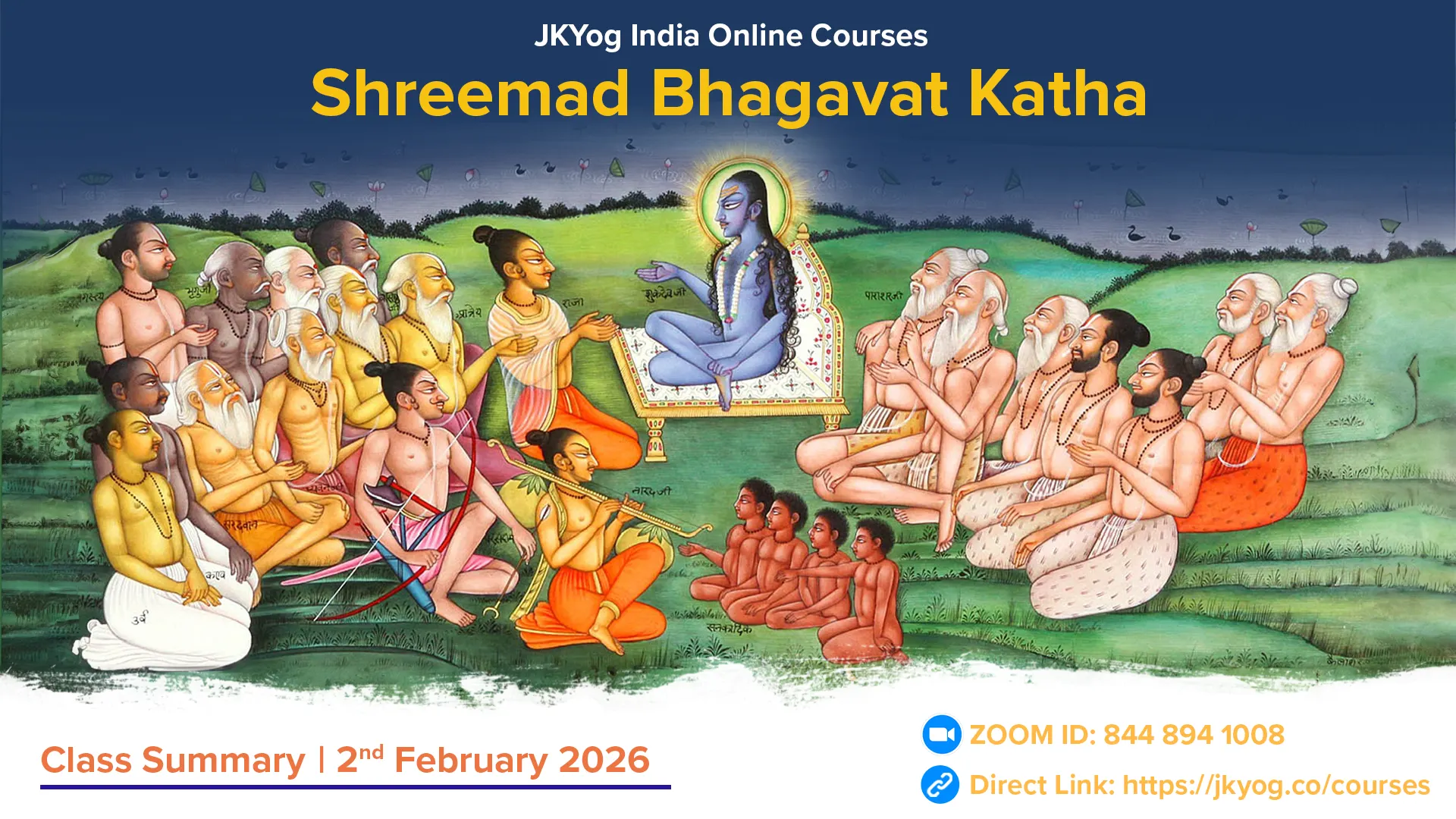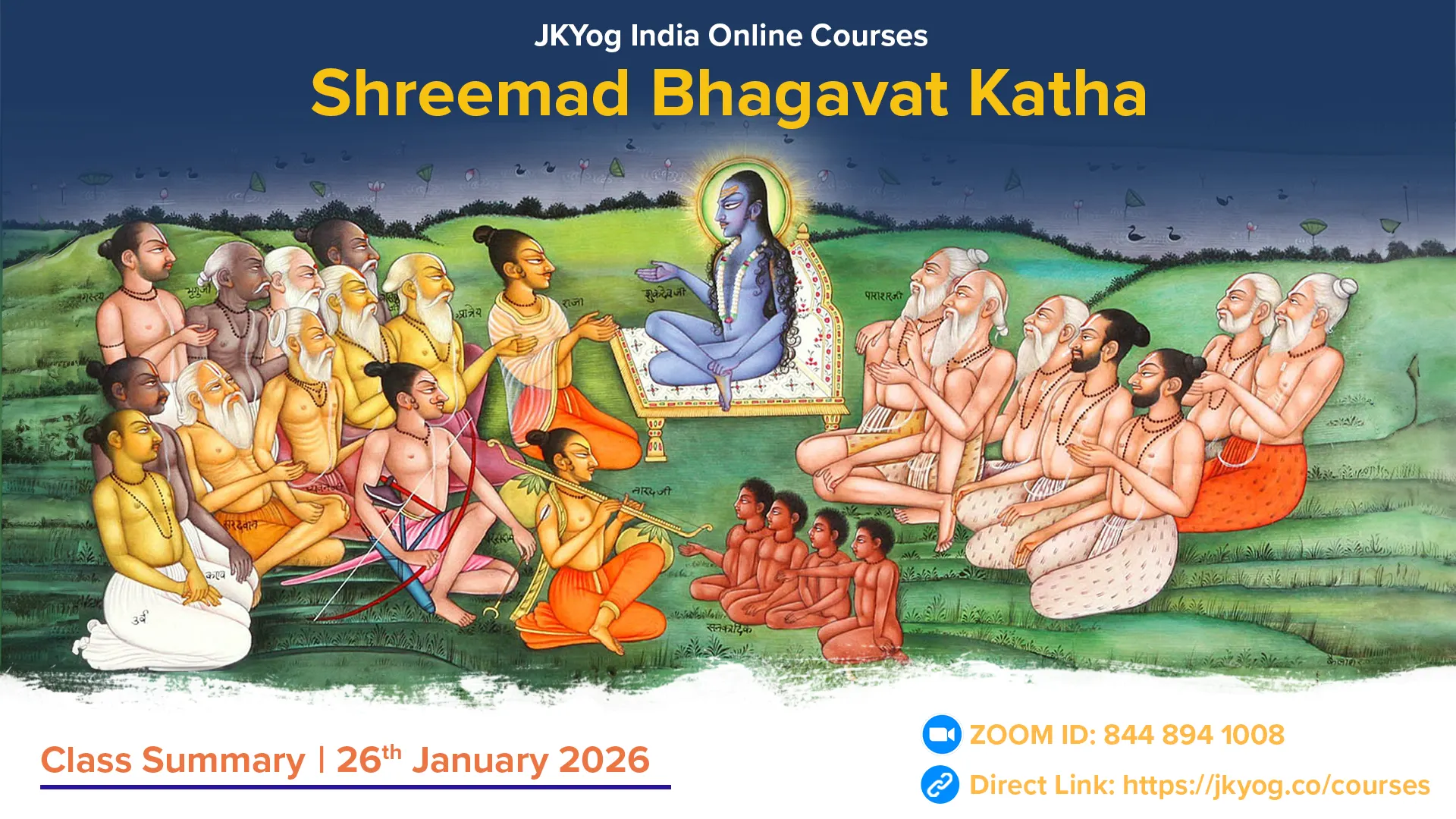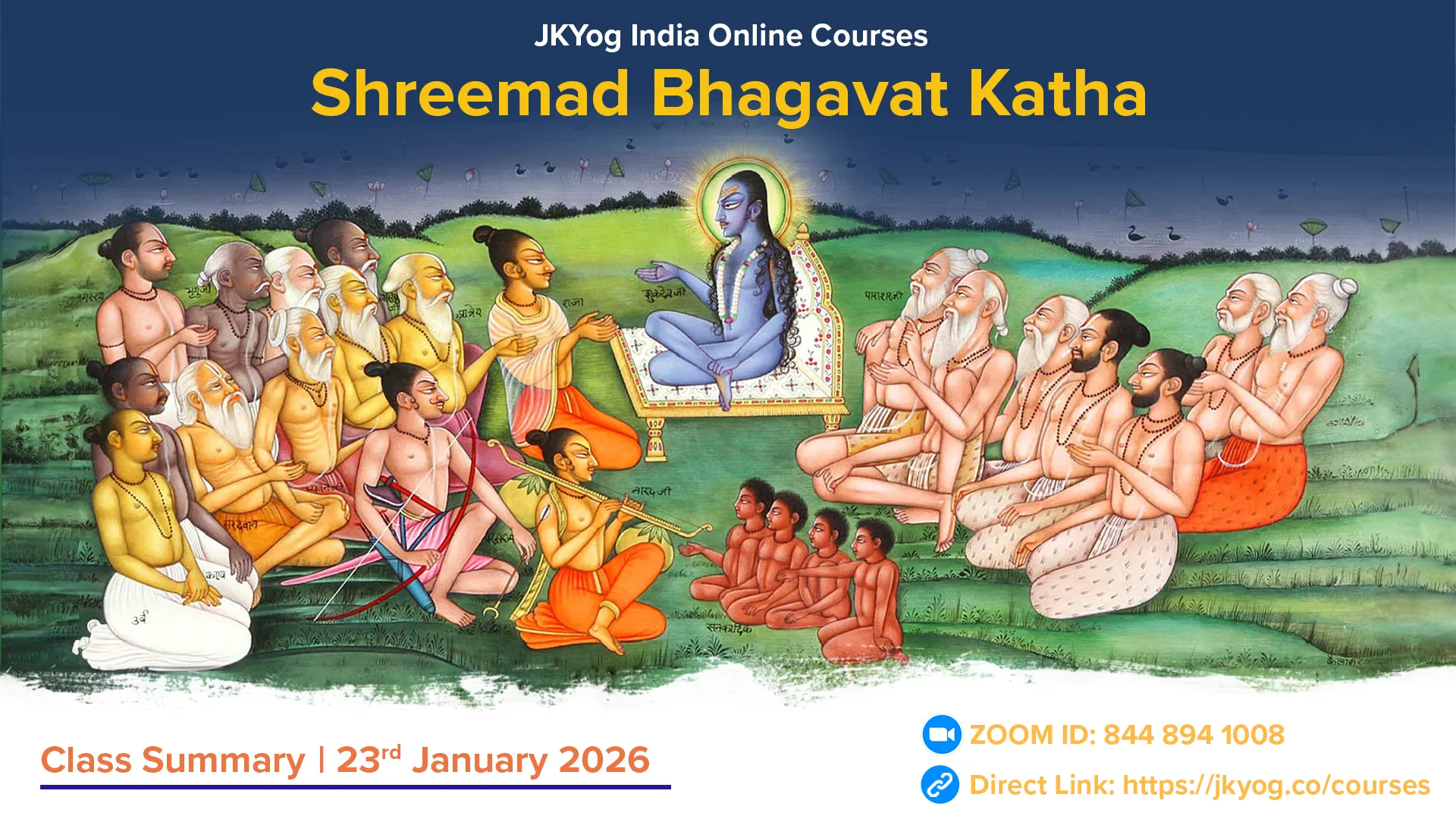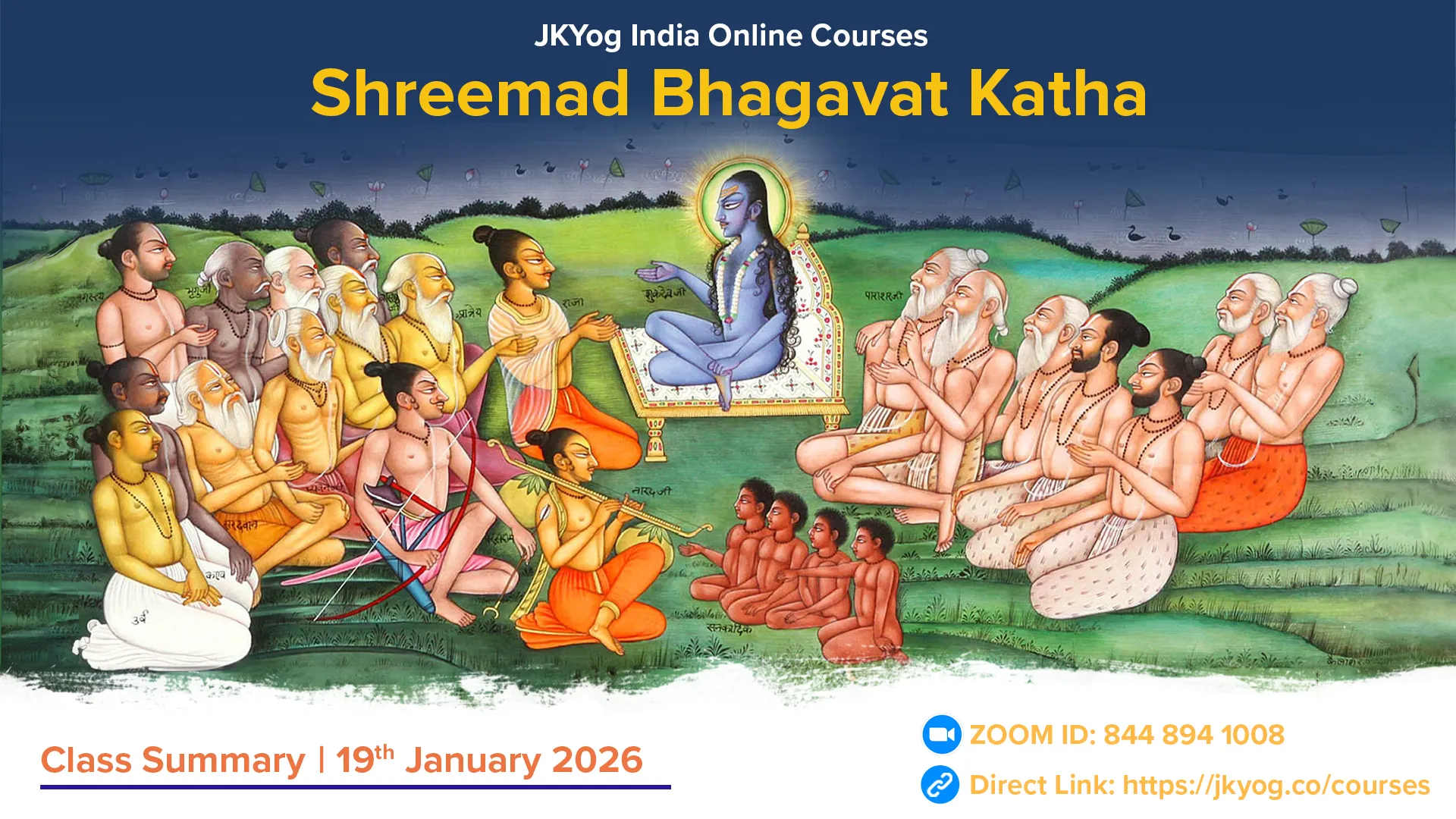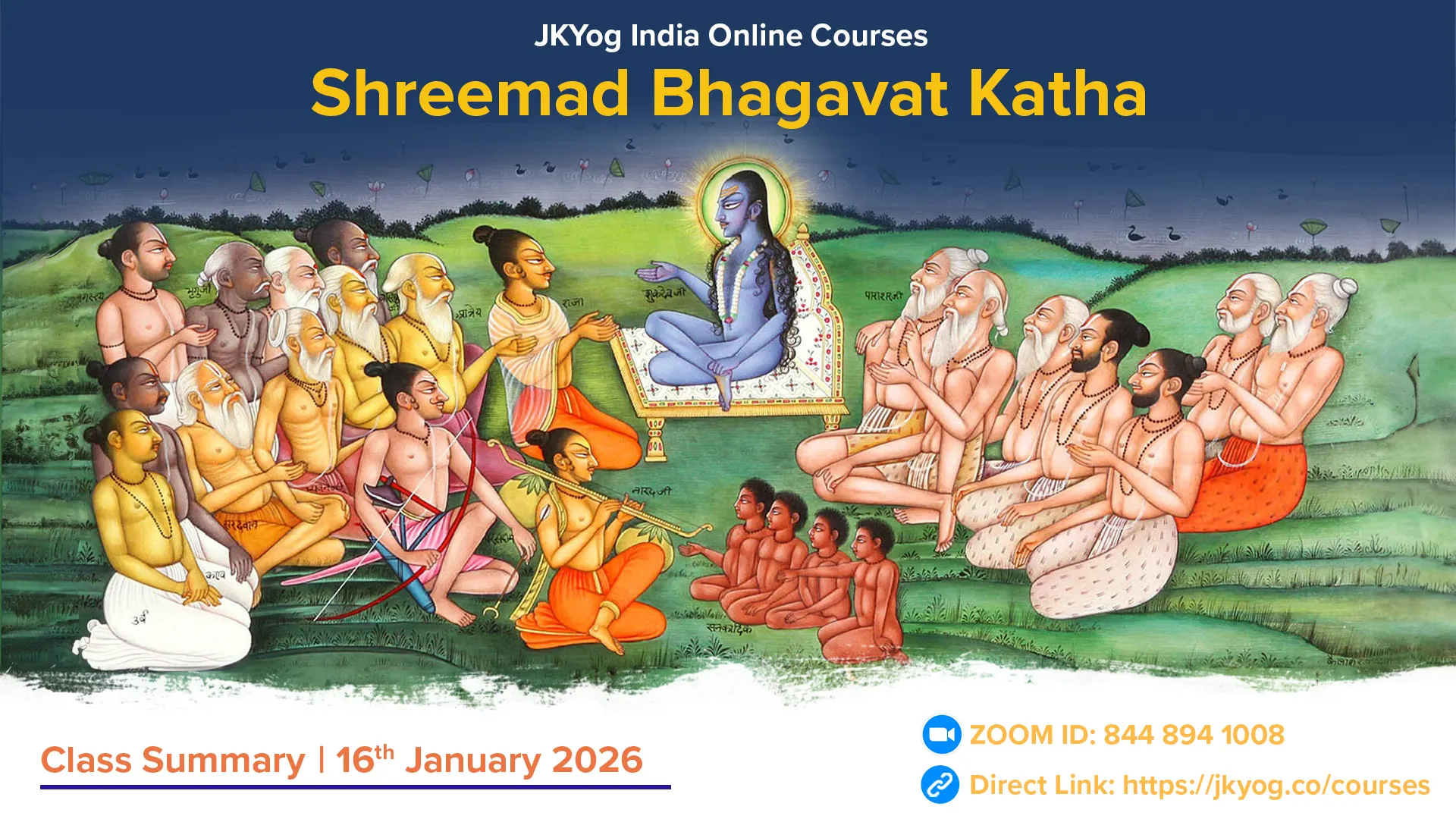Shreemad Bhagavat Mahapuran- Canto: 8, Chapters: 13-17
Shree Shukdevji describes to Parikshit the current seventh Manvantar and the future ones as follows:
Seventh Manvantar (Current Manvantar):
- The Manu is Vaivasvat Manu (Shraddhadev), the son of the sun god Vivasvan. His sons are: Ikshvaku, Nabhag, Dhrishta, Sharyati, Narishyant, Nabhaag, Dishta, Karusha, Prishadhra, and Vasuman.
- The Indra of this Manvantara is Purandar.
- The deities are the Adityas, Vasus, Rudras, Vishvadevas, Maruts, Ashwini Kumars, and the Ribhus.
- The seven great sages (Saptarshis) are: Kashyap, Atri, Vasishtha, Vishwamitra, Gautam, Jamadagni, and Bharadwaj.
- In this Manvantar, God incarnated as Vamana from the womb of Aditi, the wife of Kashyap, and asked for the entire Triloka (three worlds) in three steps from King Bali.
Eighth Manvantar:
- The Manu will be Savarni, son of the Sun god and his wife Chhaya. His sons will include Nirmoka, Virajas, and others.
- In this Manvantar, Bali, the son of Virochana, will become Indra. The deities will be Sutapa, Viraja, Amritaprabha, and others.
- The Saptarshis will be: Galav, Diptiman, Parashurama, Ashwatthama, Kripacharya, Rishyashringa, and Ved Vyas.
- God will incarnate as Sarvabhauma from the womb of Saraswati, wife of Devguhya, and grant the kingdom of heaven to Bali by taking it from Indra.
Ninth Manvantar:
- The Manu will be Daksha Savarni, son of Varun. His sons will be Bhootketu, Diptiketu, and others.
- Adbhuta will be the Indra. The deities will include Par, Marichigarbh, and others.
The Saptarshis will include Dyutiman and others. - God will incarnate as Rishabh from the womb of Ambudhara, wife of Ayushman, and grant Triloki to Indra.
Tenth Manvantar:
- The Manu will be Brahma Savarni, son of Upashlok. His sons will include Bhurishen.
- Shambhu will be the Indra. The deities will be Suvasan, Viruddha, and others.
- The Saptarshis will be Havishman, Sukriti, Satya, Jaya, Murti, and others.
- God will incarnate as Vishwaksen from the womb of Vishuchi, wife of Vishwasrij, and befriend the Indra Shambhu.
Eleventh Manvantar:
- The Manu will be Dharma Savarni. His sons will be Satya, Dharma, and others.
- Vaidhrit will be the Indra. The deities will be Vihangam, Kaamagam, Nirvanaruchi, and others.
- The Saptarshis will include Arun and others.
- God will incarnate as Dharmasetu from the womb of Vaidhrita, wife of Aryak, and protect the three worlds.
Twelfth Manvantar:
- The Manu will be Rudra Savarni. His sons will be Devvaan, Upadev, Devsreshtha, and others.
- Ritudhama will be the Indra. The deities will include Harit.
- The Saptarshis will be Tapomurti, Tapasvi, Agnidhra, and others.
- God will incarnate as Swadham from the womb of Soonrita, wife of Satyasaha.
Thirteenth Manvantar:
- The Manu will be Deva Savarni. His sons will be Chitrasen, Vichitra, and others.
- Divaspati will be the Indra. The deities will be Sakarma, Sutram, and others.
- The Saptarshis will be Nirmoka, Tattvadarshi, and others.
- God will incarnate as Yogeshwar from the womb of Bahti, wife of Devhotra, and bestow the position of Indra to Divaspati.
Fourteenth Manvantar:
- The Manu will be Indra Savarni. His sons will be Uru, Gambhir, Buddhi, and others.
- Shuchi will be the Indra. The deities will be Pavitra, Chakshush, and others.
- The Saptarshis will be Agni, Baah, Shuchi, Shuddha, Magadh, and others.
- God will incarnate as Brihadbhanu from the womb of Vitaana, wife of Satrayan, and expand the paths of Vedic rituals.
After hearing the detailed account of all fourteen Manvantars, their Manus, sons of Manus, Indras, devatas, Saptarshis, and incarnations of God, Parikshit humbly asks Shree Shukdevji, "You have mentioned the various Manus, their sons, the Saptarshis, and others for each Manvantar. Who appoints them to their respective roles? What are their specific duties, and how do they carry them out? Kindly explain all this to me in detail."
In response, Shree Shukdevji says:
All the Manus, their sons, the Saptarshis, and the devatas are appointed by Bhagwan Himself; the Supreme Lord alone is the origin of their roles and responsibilities. The incarnations of Bhagwan, such as Yajna Purush and others already described, are divine forms that inspire and direct them to govern the universe's affairs.
At the end of each Chaturyug, due to the turning of time, the Vedic scriptures, or Shrutis, almost vanish; at that time, the Saptarshis, through deep penance and realisation, rediscover them. From these rediscovered Shrutis, the eternal principles of Sanatan Dharma are preserved and passed on.
By the will of Bhagwan, each Manu, in his respective Manvantar, ensures that Dharma, in all its four aspects—truth, purity, austerity, and compassion—is properly practised across the earth; the sons of Manu, throughout the span of that Manvantar, organise time and space, maintain order in society, and uphold Dharma.
In relation to the Pancha Mahayajnas, the five great daily duties, the devatas of each Manvantar accept their share of offerings through yajnas performed in connection with sages, ancestors, spirits, and humans.
Indra, the king of the devatas, enjoys the immense wealth of the three worlds bestowed upon him by Bhagwan; he governs the people and ensures their protection, and it is he who has the authority to bring timely rainfall to the world.
Bhagwan, in every Yug, manifests as:
- Sanak and other siddhas to teach Jnana (spiritual wisdom);
- Yajnavalkya and other rishis to guide in Karma (ritual action);
- Dattatreya and other yogeshwars to impart Yog (spiritual discipline and union with God).
He takes the form of Prajapatis, such as Marichi, to expand creation; as emperors, to punish the wicked and uphold justice; and in the form of heat, cold, and other qualities, He becomes Time itself, leading all beings towards their end.
However, due to maya, the illusion created by names and forms, the intellect of living beings becomes confused; although various philosophical traditions extol the glory of God in many ways, they are unable to comprehend His eternal and essential nature truly.
Shree Shukdevji says, “Parikshit, in this way I have described to you the measure of a Mahakalpa and the intermediate Kalpas. Scholars well-versed in the Purana-tattva state that each intermediate Kalpa contains fourteen Manvantars.”
The Rise of King Bali, the Defeat of Indra, and the Backdrop of Vaman Avatar
Hearing this, Parikshit curiously asks, “Shree Hari is the Almighty and Self-satisfied; then why did He, appearing as a humble seeker, ask King Bali for just three steps of land? And after getting what He desired, why did He bind Bali? What was the reason that the Lord of all yajnas had to request something, and why did He imprison an innocent Bali?”
Shree Shukdevji replies that when Indra, the king of the devatas, defeated Bali and seized all his wealth, including his life, Bali was revived by the daitya-guru Shukracharya using the Sanjivani Vidya. After this, Bali fully surrendered himself to the service of Shukracharya and all the Bhrigu-lineage Brahmins. Pleased by his humility, those Brahmins blessed him and organised a yajna called Vishwajit.
When Bali offered oblations into the sacred fire, a divine chariot named ‘Vishwajeet’, adorned with gold, celestial bow and arrows, an inexhaustible quiver, armour, flag, and other war equipment, emerged from the yajna-kund. His grandfather, Prahlad, gave him an immortal garland, and Shukracharya gifted him a conch.
Thus equipped for battle, Bali mounted the divine chariot and, along with his vast daitya army, set out toward heaven. He appeared so radiant that it was as if fire was blazing out from the sacrificial fire altar. His army was so fierce and vast that it seemed ready to swallow the skies. Bali marched toward Amravati, the celestial city of the devatas, filled with divine wealth, beauty, apsaras, celestial maidens, flying chariots, and enchanting music, all crafted by the celestial architect Vishwakarma.
Bali surrounded Amravati from all sides with his mighty forces and blew the conch, declaring war. When Indra sensed the immense strength of Bali, he approached the Devaguru, Brihaspati, and shared his concerns about the source of Bali’s power. Brihaspati explained that all of Bali’s rise and strength were due to the blessings of the Bhrigu-lineage Brahmins. Only Bhagwan Himself could now stop Bali; no one else had the power to do so. He advised that the devatas should vacate heaven and go into hiding, waiting for the moment when Bali would eventually disrespect the Brahmins; only then would his downfall begin.
Following their guru’s counsel, the devatas left heaven. Bali seized control of Amravati and conquered all three worlds. The Bhrigu Brahmins had him perform one hundred Ashwamedha Yajnas. From these yajnas, Bali’s fame spread in all ten directions, and he shone like the full moon. He enjoyed the prosperous kingdom obtained through the blessings of the Brahmins and felt fully content.
When the devatas fled and went into hiding, and the daityas took control of heaven, Devi Aditi, the mother of the devatas, was deeply distressed. She felt abandoned, as if she were someone without support or protection.
One day, after a long time, Rishi Kashyap’s deep meditation ended, and he returned to Aditi’s ashram. Upon arriving, he noticed that the atmosphere there was neither peaceful nor joyful; there was no sign of festivity or decoration. Seeing this, Kashyap Muni asked Aditi, “Is Dharma in danger? Has there been any lapse in hospitality? Are the daily fire rituals like Agnihotra not being performed properly?” He expressed concern that perhaps some negligence had occurred during his absence.
In response, Devi Aditi, with great humility, said, “Swami, Dharma, the Brahmins, the cows; all are well. I have not faltered in my duties of service and devotion, even in your absence. Yet, I am troubled in my heart. The daityas have snatched away the glory, positions, and homes of our sons. They are suffering, and there is no one more compassionate and capable than you. Please show me a way by which the devatas can regain their rightful place.”
Hearing her words, Kashyap Muni replied, “Aditi, this attachment is indeed a strange force. The soul is neither wife nor mother nor child of anyone; yet the illusion of maya is so powerful that it clouds even the highest wisdom. Still, you must worship Bhagwan Vasudev. He is full of compassion; He is ever-loving to His devotees. Surely, He will fulfil your heart’s desire. Devotion to Bhagwan Vasudev is never fruitless. This is the only true solution.”
Aditi’s Payo Vrat and Bhagwan Vishnu’s Blessing
Devi Aditi then asked Kashyapji, “By what method should I worship Bhagwan Vasudev so that He becomes pleased and restores the lost prosperity of my sons?” In response, Kashyap Muni told her about the Payo Vrat, a sacred observance that Brahmaji Himself had once instructed him. This vrat (vow) is extremely dear to Bhagwan Vishnu and is known to fulfil all desires.
This vrat is observed over twelve days, starting from the Shukla Pratipada (first waxing lunar day) of the month of Phalgun till Trayodashi (13th day). During the vrat, only milk is consumed, the observer sleeps on the ground, and bathes three times a day. One must strictly adhere to celibacy, truthfulness, self-control, and refrain from harming any living being.
Each day, one should worship Bhagwan Vishnu in the form of an idol, on the altar, as the Sun, Fire, and Guru. The Lord should be offered a ritual bath, clothes, flowers, incense, lamps, and other items of worship, while chanting the mantra ‘Om Namo Bhagavate Vasudevaya’ during japa (recitation) and homa (offering into fire). If possible, one should offer kheer (a sweet dish made with milk, ghee, and jaggery). On the final day (Trayodashi), bathe Bhagwan with Panchamrit (a mixture of milk, curd, honey, ghee, and sugar), offer fine garments, ornaments, fruits, kheer, and satisfy Brahmins and guests. One should give donations such as cows, land, gold, food, and clothes to the poor, and only then take one’s own meal while remembering Bhagwan.
Along with the vrat, one should also engage in kirtan (chanting of names), stuti (glorification), and listening to divine stories. Kashyapji said that this vrat is superior to all yajnas, austerities, and charities, and Bhagwan Vasudev becomes quickly pleased by it and fulfils all desires. He blessed Aditi, saying, “You are fortunate; perform this vrat with faith and discipline, and Bhagwan will certainly fulfil your wish.”
With great devotion and caution, Aditi observed this vrat for twelve days. She made her intellect the charioteer and, using the reins of the mind, brought the wild horses of the senses under control. With unwavering concentration, she meditated on Bhagwan Purushottam. She fully surrendered her mind to Bhagwan Vasudev and faithfully followed the vrat.
At the completion of the vrat, Bhagwan Himself appeared before her, dressed in yellow garments, with four arms, holding the conch, discus, and mace. Upon seeing Him, Devi Aditi was overwhelmed with devotion. She prostrated before Him, tears streamed from her eyes, her body shivered with ecstasy, and she remained speechless, absorbed in divine love. After some time, she softly began to praise Him, “O Bhagwan! You are the embodiment of yajna and its supreme enjoyer. Taking refuge at Your feet, one crosses the ocean of material existence. Even chanting and hearing Your names makes life successful. You are the primal being, the shelter of all, infinite, and yet You take many forms for the sake of Your divine plays. When You are pleased, one attains even Brahmalok, supernatural powers, wealth, Dharma, Artha, Kama, and ultimately Moksha.”
Bhagwan smiled and responded, “O Devi! I know what your heart desires. Your sons, the devatas, including Indra, have been defeated by the asuras. You wish for their victory and to see the wives of those asuras weeping in defeat. But at present, it is not possible to vanquish the asuras, as Brahmins favour them. However, I am extremely pleased by your Payo Vrat. Your worship will not go in vain. I shall enter the virya (essence) of Kashyapji in a partial incarnation and be born as your son. I shall protect your divine sons. See Me in Kashyapji and serve him with reverence. However, please remember not to reveal this to anyone. The more hidden the divine secrets are, the more successful they become.”
Saying this, Bhagwan Vishnu disappeared. At that moment, Aditi felt truly fulfilled, knowing that the Supreme Lord Himself would be born through her womb.
Summary: JKYog India Online Class- Shreemad Bhagavat Katha [Hindi]- 18.07.2025

